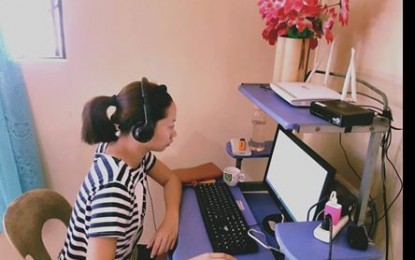
WORK FROM HOME. Photo shows an employee adopting a work-from-home scheme during the enhanced community quarantine to contain the spread of the coronavirus disease 2019 (Covid-19). To maintain mental health during the quarantine period, a disaster clinical psychologist told Ilonggos on Monday (March 23, 2020) not to lose social connection with friends and families through communication technologies. (Photo courtesy of Robert John Nievares)
ILOILO CITY – While observing preventive measures against the pandemic, people can still make connections and maintain relationships, Dr. Johnrev Guilaran, disaster clinical psychologist and assistant professor at the University of the Philippines Visayas on Monday said.
He said people can practice “physical distancing” and not “social distancing.” Physical distancing is maintaining at least one meter from each other to slow down the spread of the disease, he told the Philippine News Agency (PNA) in an interview.
The threat of the coronavirus disease 2019 (Covid-19) has prompted the government to impose enhanced community quarantine in this city and in the provinces in Panay island.
Based on the order of Iloilo Governor Arthur Defensor Jr., Ilonggos shall observe strict home quarantine with the movement of people shall only be limited only to accessing basic necessities and health needs.
Social events are banned and people in public places like streets and plazas are prohibited during the curfew hours.
“It’s not social distancing but rather physical distancing. We distance ourselves physically but we continue to connect socially through texting and calling. We maintain social connection,” Guilaran said.
Checking on friends and families from afar also helps people cope with the quarantine situation. “Talk to them via phone. Ask each other how you are because it is one way of maintaining mental health,” he said.
Guilaran explained the current health crisis brings uncertainty to people due to the lack of information.
“They experience anxiety because they do not know what is happening. The common initial reaction that we observe is psychological distress,” he said, adding that the Covid-19 is a special case as it is a global phenomenon.
The anxiety in people may manifest physically, he said. Some experience headaches and back pains which lead them to think that they might as well infected with the disease.
He said the enhanced community quarantine has disrupted the daily routine of people which involves going out for work and other activities.
“The routine has changed and it is very stressful,” he said.
Citing studies, Guilaran said people can eventually adapt to the situation. “What can we do for now is to make sure that we are calm and collected,” he said.
Guilaran also discouraged the use of alcoholic beverages and cigarettes to combat tension. Instead, he said people may opt to discover other hobbies while they have ample time.
Taking a break from social media also helps, he said.
He also encouraged people to get involved in productive activities like fundraising and making improvised personal protective equipment.
“Try to do things that you cannot do before because you do not have time,” he said. (PNA)
